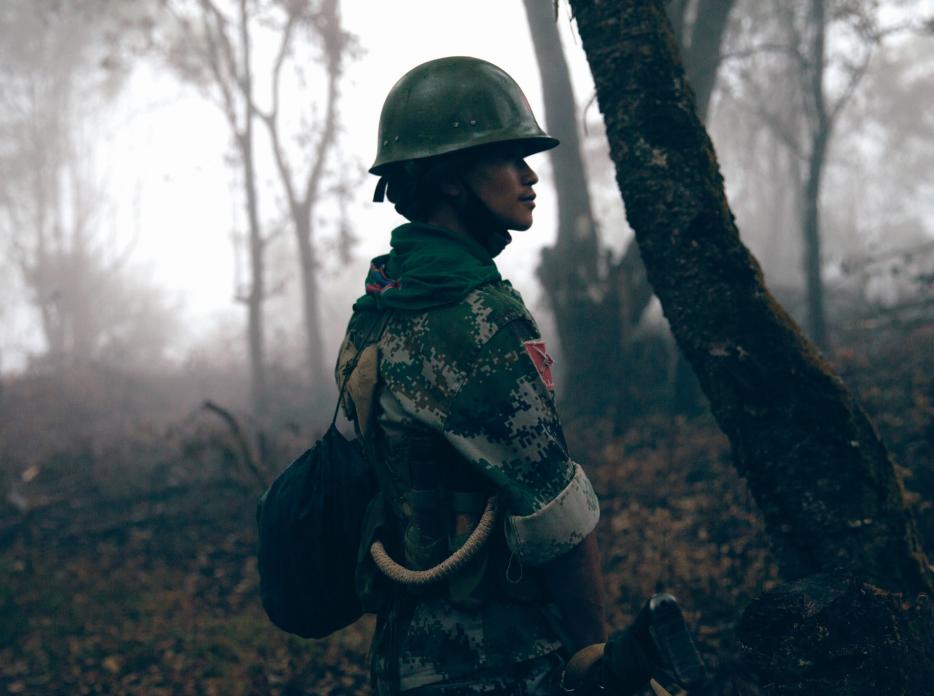The boy died on Tuesday. Inexperience, the pastor said. That’s what killed him. The road dipped suddenly and we jumped in our seats. He smoothed the leather bible that rested primly on his knees. Today was Sunday, and he’d been tasked with the young rebel’s memorial service. Outside, smoke gathered over the morning fields. April is the burning season in northern Burma, when, ahead of the rains, Kachin farmers torch the forests to prepare the flinty mountain soil for planting. This time around the fighting had driven thousands from their land before they could finish the job. They fled to the camps along the Chinese border. Depending on how you looked at it, you could say that the boy was one of the soldiers who died trying to protect them.
The rebel outpost sat at the end of a dirt track chopped into the mountainside. It was here the boy’s company was posted, and here the boy was gravely wounded trying to bury a landmine. His CO, an energetic young lieutenant, met us as our jeep pulled up. He shook the pastor’s hand, his expression fervent. Smooth-cheeked and faintly bookish, he looked too young to command the soldiers who squatted, morose, outside the thatch camp huts. In the common area between, a table and three cane benches had been placed for the service. The pastor needed a few minutes to prepare, so we left him there and walked out to see the enemy positions. One of our escorts was a soldier in his 50s, a retired officer who re-enlisted when the ceasefire broke, the other an awkward youth of about 25 in a peaked cap who filmed everything with his phone. They led us down into the network of sunbaked trenches that overlooked the front line. In the distance the peaks multiplied, ridge upon ridge, each fainter than the last, until they vanished.
There, the younger soldier said, pointing.
I squinted to see. On the far side of the valley, not more than a kilometre away, was a small clearing in the jungle, and the glint of something metallic: a roof, or a jeep, or maybe artillery. It didn’t seem like much. The scene was so quiet and the soldiers so bored-seeming that it was easy to overlook the immediacy of the threat. But there were six more enemy posts, silent and glinting, in every direction except behind us. As the retired officer pointed out, a sniper could take your head off from any one of them if he wanted to. From the valley floor, long since emptied of Kachin villagers, smoke spired up. The hated Burmese Army was on the move, clearing jungle for an encampment lower down.
I asked about the boy. The younger soldier shrugged and continued to film. I noticed that two thumbs sprang from the joint of his right hand, each with its own small nail.
The retired officer said the boy sacrificed his life for his people and his nation, and for that they owed him and his family a debt of gratitude. It was a line I’d heard before, in response to other questions about other dead soldiers.
Further along the ridge we stopped again. Here, he said, pointing down the hillside. That’s where it happened.
I tried again. Was he a good soldier?
He was young, the retired officer said. Barely out of school. The fact of the boy’s death was telling: landmines in Kachin State often maim and rarely kill. Unless you’re handling the thing when it explodes. For all their stoicism, the soldiers were perhaps a little embarrassed for him.
He told a joke once, the two-thumbed soldier said.
Tell it to me, I said.
But he couldn’t remember.
We retreated to the shade of a tree. After a time, a special-forces soldier emerged from the far side of the camp and dropped what looked like a metal flower at our feet. Bomb, he said. The others gathered round, passing the chunk of shrapnel from man to man, admiring its heft. There was some speculation about the provenance. Though there was fighting going on right now, this particular outpost hadn’t seen action in over a year, since a Burmese helicopter firebombed one of the lookouts and the rebels were forced to retreat before mounting a counter-attack to regain the position. Only two or three of the group had been around for the fight. The rest were posted here within the last few months—they moved regularly from post to post within their battalions. Looking around I saw a mix of new recruits and hardened fighters. A lot more of the former than the latter.
The scene was so quiet and the soldiers so bored-seeming that it was easy to overlook the immediacy of the threat. But there were six more enemy posts, silent and glinting, in every direction except behind us.
The pastor delivered the memorial to a congregation of about 20 soldiers in all. For his sermon he chose a few passages from the Book of Samuel. The story of David, King of the Israelites, was popular for obvious reasons. Devout Christians in Buddhist Burma, the Kachin had been holding onto their patchwork territory through a series of wars and ceasefires. Outmanned and outgunned, they were three years into the latest conflict, a stop-start war complicated by the vagaries of mountain warfare—the fighting ebbed and flowed along a tortuous front line—and geopolitical intrigue. China was playing both sides for logging and mining interests in the territory.
About the boy the pastor said very little that wouldn’t be said about every soldier killed in the line of duty: He was courageous, his life ended too soon, we must all of us honour his memory. There was no mention of how he died. The reality was that until a few months ago the boy was a farmer and IDP, and what had he really known about fighting? His was the story of practically every regular soldier in the rebel army, cut shorter than most. They started out as smallholders and cowherds and students, they were chased from their villages by the Burmese Army, and, faced with a choice between the boredom and privation of the IDP camps or a life on the front lines, they joined the fight. It had long since become a right of passage in Kachin culture. Eventually, if they lived long enough, they got good at fighting, good enough to keep the Burmese at bay for another generation. The Kachin Independence Army had been doing this for 50 years and you got the sense that they could do it for 50 more.
After the memorial I asked the lieutenant to find me someone who knew the boy well. When there were no volunteers the lieutenant said, a bit sheepishly, that the boy was not with the company for very long. Finally one of the recent recruits stepped forward and managed a few words before he was overcome with tears. He rose and hurried away, ashamed. The lieutenant offered that the dead boy was well liked, even though he said very little. He took his duties seriously.
With better luck he might have retired after a few years of service, found a wife, and resumed farming somewhere deeper in the rebel-held territory, away from the conflict. The soldiers received only room and board during active service, and the pensions weren’t much, but they were something. Enough, anyway, to start again, small. Better than a hand-to-mouth existence in the camps and better than life under the Burmese.
His name was Jang Ma Tawng La. He liked kick-volleyball and movie. He was 20 years old.
This piece was originally published in Hazlitt No. 2






